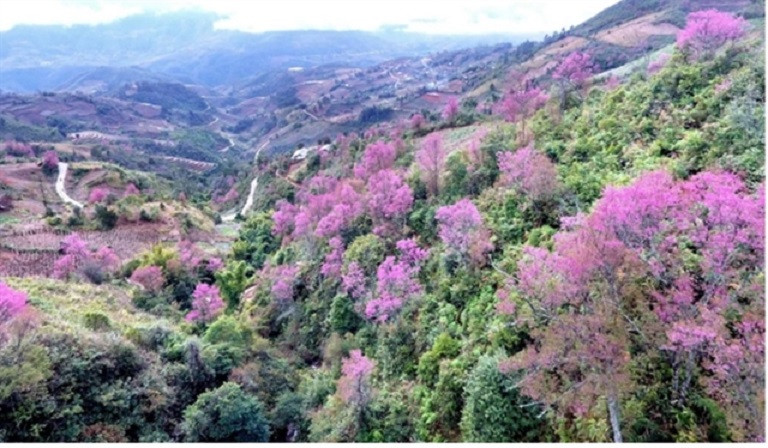
The cultural activities will start with an opening ceremony on December 23 highlighting the two important events of Tớ Dày Flower Festival 2023 and Khèn Mông Performance Festival.
Tớ dày (wild peach) flowers have become a symbol of the harsh lands of Mù Cang Chải when winter arrives, with clusters of the red-pink flowers on hillsides creating a beautiful scene.
The most beautiful time to visit the high mountainous region of Yên Bái is when the tớ dày flowers bloom from mid-December to the end of January and blanket the local area in a reddish-pink hue.
The tree only grows and blooms at altitudes more than 1,000m above sea level. It is also a symbol of spring and new crops, and has become a popular tourist attraction.
At the opening ceremony, the cultural and tourism authority of Mù Cang Chải will announce a certification recognising the performance of khèn Mông as a National Intangible Cultural Heritage and launch the Khèn Mông Festival.
More than 1,000 artisans and actors from across Mù Cang Chải will participate in performing khèn Mông at the ceremony.
Khèn (panpipe), a traditional musical instrument of Mông people, is indispensable to the daily life of the ethnic group and is a unique feature of the local culture.
The provincial cultural authority will also announce the art of using beeswax to create batik patterns on fabric of the Mông people in the three districts of Mù Cang Chải, Trạm Tấu and Văn Chấn in Yên Bái Province as a National Intangible Cultural Heritage.
Trịnh Thế Bình, director of the Mù Cang Chải's Culture and Information Department, said preparations for the two festivals have been undertaken as planned.
The two events will be held in the district's stadium, with its facilities having been upgraded with 1,200 seats for local participants and visitors, according to Bình.
A paragliding performance programme will be provided at Khau Phạ Pass by the Việt Nam Tourism and Sports Joint Stock Company.
A wide range of activities will take place during the festivals, including musical performances, photo exhibitions and folk games.
The district will also organise other programmes as part of the two festivals such as a street performance, a recreation of the Mông ethnic cultural space, a khèn dance contest and an experience of local food.
More than 200 students at localities have been mobilised to support the organising of the events.
Lương Thị Xuyến, deputy chairwoman of the People's Committee of Mù Cang Chải District, said the recognition of khèn Mông performance and the art of batik, using beeswax to resist the dye and create patterns on fabric, of the Mông people in three districts as National Intangible Cultural Heritages were a great encouragement for local people, especially the Mông ethnic group, at the same time fostering their pride about their own cultural identity, thereby continuing to preserve and promote traditional cultural values.
About 300km from Hà Nội and located by the foot of the majestic Hoàng Liên Sơn mountain range, Mù Cang Chải has some of the most spectacular scenery in the world, where terraced fields spread like stairs to the horizon.
Mù Cang Chải's 500ha of terraced fields – a cultural heritage created over generations by local ethnic minorities in the communes of La Pán Tẩn, Chế Cu Nha and Dế Xu Phình – have been recognised as a special national site by former Prime Minister Nguyễn Xuân Phúc.
The site was listed among national relics and distinguished landscapes by the Ministry of Culture, Sports and Tourism in 2007. It has also been listed for many years among the ten most beautiful terraced fields in the world.
The district's Khau Phạ Pass, one of the four great passes of Việt Nam, has become a famous tourist destination throughout the country and abroad. — VNS